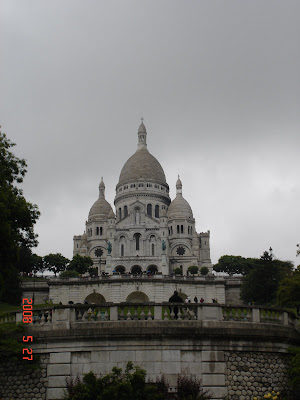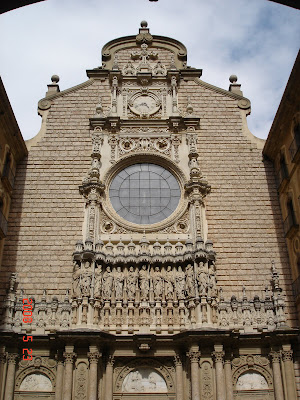I expected the start of the year to be rough and it was. Recruiting for Summer Internship positions in a top Business school like Darden is very competitive and challenging. I came back from vacation early and put in a great deal of effort in preparing for interviews. As expected, I did not get many interview calls but was happy on getting couple of my top choices. Though I felt I was doing my best and interviewing well, I did not have much luck early on. However, things changed for the better in February when I made through to my top choice. Life changed dramatically. I was done interviewing and could relax and enjoy myself. Making a transition to a top consulting firm was one of my top priorities and I was pleased to have achieved it. Rest of Q3 at Darden went by in a flash.
‘Traveling’ was one the key ‘things to do’ that I had indentified earlier and Europe one of the primary destinations. The Barcelona GBE during spring break was my first opportunity to travel to a European city and it was even better to have done it with good friends. It was a great experience and set me up for the backpacking trip later in the year. My two week backpacking trip in May has to be the highlight of the year. I meant this to be a teaser to prepare for bigger and longer backpacking trips in the coming years. I was totally fascinated by the things I saw, people I met, and the freedom and excitement you experience while backpacking.
Quarter 4, for me, was the time between my two European trips. I played some tennis, soccer, partied a lot and did a little bit of studying. It was enjoyable time, Darden and academics were not high on my agenda. I was more interested in preparing for my upcoming trip to Sydney, Australia where I would be doing my Internship. I had never been to Australia before and was naturally very excited for both work and travel reasons. When I finally made it there, I absolutely enjoyed the work and culture at the consulting firm. Better still, I managed to find time to explore Sydney, Melbourne and surrounding areas and was thrilled by the quality of life in Australia. Not surprisingly I signed my full-offer soon after I received it. I felt extremely fortunate to have secured a full-time job in such a tumultuous economic environment.
I was back in Charlottesville in early August for the second year at Darden. First quarter turned out to be little harder than expected. In hindsight, I should have been better prepared knowing fully-well that I had front loaded my class and was also taken a couple of really tough courses. I was also really excited to meet the incoming class and be of any help in anyway. First quarter was pretty uneventful as I didn’t do much other than what was required. I spent more time hanging-out, playing video games with my roommate and partying, but having worked pretty hard earlier on I felt I deserved to take it easy. The exceptions to the rule were academic tutoring and career coaching for the First years.
Mid October I managed to take a few days of for a trip to Minneapolis. It was a wonderful trip as I got to hang out with the usual suspects, few of my closest and favorite friends, at the places we frequented so often when I lived there. We re-visited the good old times. Sometimes I wish I was still back there but then again, I guess you got to move on. For thanksgiving weekend I headed down to Atlantic City with another group of friends from Darden. Though the place was unusually quite we had our fun playing poker and blackjack. Trip was enjoyable and full of friendly banter, mainly attributable to the company rather than the location. Q4 like Q3 was more about outside Darden activities than inside. This included lot of going-out, a hiking trip, Wednesday & Sunday Salsa dancing, and little soccer and basketball.
Couple of years back I abandoned my yearly goals in favor of a continuing ‘things I want to do list’. I’ll write more about the list sometime later. Nevertheless, Year end is still a good time to reflect on things I and examine whether I spent my time on things most important to me. Traveling was key item for me and I especially wanted to travel to Europe. Having been on 4 continents during the year, including Europe, and having traveled to East coast, Mid-west and West coast in the US, I have a lot to be happy about. I am also quite pleased with my efforts at Darden both academic and career related. When I could I did help out others with preparation on recruiting and tutoring first years on academic. Overall pretty satisfied on this front too. On the personal side, I improved tremendously on my Salsa dancing skills and picked up little bit of other ‘Ballroom Dances’ too.
Even though I had plenty of free time, I did not pick up anything specific i.e. entrepreneurial, innovative or community oriented activity during regular academic session. This time could have been better used. I read a couple of interesting books but lesser than in any of the last few years. I planned to learn speaking Spanish but did not make much progress. Something I hope to correct soon. I am still not sure if I should have done something different day to day or it was just fine enjoying life. “Things I want to do’ list provides me more clarity on what’s important long term but as far as the short term goes I am happy to let things drift. I will have to think about that sometimes soon.
Looking back, it was pretty eventful and exciting year and I am quite pleased with how things went. I hope 2009 will be as exciting as this year was. Do let me know on exciting things you have been up to this year and plans for the coming year. Wish you all a Happy New Year!










 Gardens in Palace of Versailles
Gardens in Palace of Versailles











 View of Champs-Elysees from in front of Arc De Triomphe
View of Champs-Elysees from in front of Arc De Triomphe





 First two days were indeed exhausting. There is so much to see in Paris and the streets are so inviting that you could walk them endlessly. I certainly ended up doing that a lot. Next two days were quickly exciting. Stay tuned for more pictures.
First two days were indeed exhausting. There is so much to see in Paris and the streets are so inviting that you could walk them endlessly. I certainly ended up doing that a lot. Next two days were quickly exciting. Stay tuned for more pictures.




















 Goodbye Cats Hostel. I am Leaving Madrid for Barcelona
Goodbye Cats Hostel. I am Leaving Madrid for Barcelona



